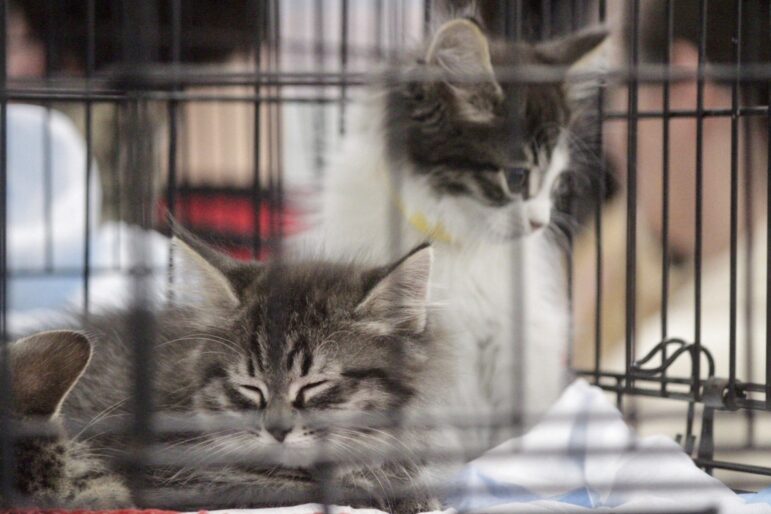
Kelsey Lester
Kittens in a cage at an adoption event hosted by Cannonsville Critters in Greenville.By BRANDY MUZ
Capital News Service
LANSING – Feral cats have colonies across the state, and their inbreeding, overpopulation and constant pregnancies have caused these strays to multiply.
Richelle Brown of the Cheboygan County Humane Society says wild cats usually flock to areas where there’s something to eat.
“They go to where they get fed. If people are feeding barn cats, they also have this colony of feral cats as well,” Brown said.
Brown said some feral cats are born with defects due to inbreeding. Misshapen heads, extra toes or crossed eyes could be results of incest among them.
“Unfortunately, there’s that vast of a population, and they’ll start to have smaller litters or the kittens will die early on in life,” Brown said.
Many shelters and humane societies run TNR – trap, neuter and release – programs. Brown said the public can participate with such programs to reduce the number of stray and feral cats.
“They can live-trap the cats, bring them in and we fix them and give them a rabies shot. Then they can pick them up at the end of the day and let them back outside,” she said.
However, Sal Palombo, who owns Michigan Animal Control, a company in DeWitt, said there’s more to curbing feral cats than simply trap and release.
“There are still strays that aren’t neutered and will continue the breeding cycle,” he said.
“The strays are not going to be interested at all in the cat that has no sexual organs. They’re going to be worried about and interested in the pheromones of the ones that do,” he said.
Palombo is a cat lover and has made friends with the feral cats around his home. But he still recognizes the harm they do to the surrounding environment, including songbirds: “You know, they’re all great, but the reality is, they’re indiscriminately killing wildlife every day.”
The Michigan Humane Society, based in Bingham Farms, reported taking in 4,861 strays in 2022.
It has multiple programs to reduce pet overpopulation, including humane education programs, discounted veterinary services for the indigent and free pet food banks, alongside its own TNR program.
Brown said helping strays not reproduce by TNR is different than saving them.
“People think they’re saving ferals by trapping them and bringing them to the shelter to surrender,” Brown said. But that doesn’t help the cat that’s never been in captivity because it behaves differently from house pets.
“They lived outside. They thrive outside,” she said, “So if we can fix them and put them back outside, as long as they’re getting food and shelter where they were trapped, then we’re letting them live.”